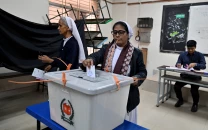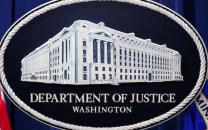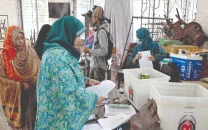US travel 'extreme vetting' to include social media, phone contacts
Kelly suggested that for some the ban could go on longer if stronger vetting procedures are not in place.

Travelers from seven predominantly Muslim countries singled out for "extreme vetting" will face scrutiny of their social media footprint and phone records, the new Homeland Security secretary said on Tuesday.
Secretary John Kelly sought to explain President Donald Trump's travel ban four days after he issued it with no warning, setting off mass protests, legal challenges and confusion.
"There are many countries, seven that we are dealing with right now, that in our view and my view don't have the kind of law enforcement, records-keeping, that kind of thing, that can convince us that one of their citizens is indeed who that citizen says they are," Kelly said in a press conference.
Iraq calls on US to review ‘wrong’ travel ban
For that reason, he said, US authorities will investigate visa applicants' social media use and telephone contacts, "so that we can see who they are talking to."
On Friday, Trump ordered a suspension of arrivals from Iran, Iraq, Libya, Somalia, Sudan, Syria and Yemen, as well as all refugees, to give time for the new government to develop procedures for extreme vetting to weed out potential extremists.
With the move under widespread criticism, Kelly denied it specifically targets Muslims, which could violate the US Constitution.
"The vast majority of the 1.7 billion Muslims that live on this planet, all other things being equal, have access to the United States," he said. "And a relatively small number right now are being held up for a period of time until we can take a look at what their procedures are."
Longer ban possible
Trump's order halted immigration from the seven countries for at least 90 days, but Kelly suggested that for some the ban could go on longer if stronger vetting procedures are not in place once the review period has elapsed.
"Some of those countries that are on the list may not be taken off the list anytime soon. There are countries that are in various states of collapse, for example," Kelly said, without offering specifics.
The sudden order caught many US immigration gateways and foreign airlines by surprise, resulting in many people with legal US residency being blocked from boarding aircraft for the United States or being detained upon arrival.
Trump's White House: Five takeaways from Monday
US Customs and Border Protection Acting Commissioner Kevin McAleenan cleared up an issue that had impacted many travelers with dual nationality, saying they could enter the United States as long as the passport they present is acceptable.
"Travelers will be assessed at our borders based on the passport that they present, not any dual national status," he said. That clarification got a cheer from Europe's Commissioner for Migration Dimitris Avramopoulos, who tweeted after speaking by phone with Kelly: "Glad that issue of EU dual nationals is resolved."
Useful and constructive phone call with DHS Secretary John F Kelly. Glad that issue of EU dual nationals is resolved. Will meet Kelly soon.
— Dimitris Avramopoulos (@Avramopoulos) January 31, 2017



















COMMENTS
Comments are moderated and generally will be posted if they are on-topic and not abusive.
For more information, please see our Comments FAQ